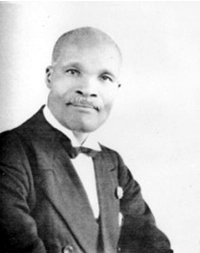Black History Month Profile

Samuel Edward Krune Loliwe Ngxekengxeke Mqhayi: A great
twentieth century writer by Professor Peter D. McDonald, Tutorial
Fellow in English
E. K. L. N. Mqhayi (1875-1945) was the leading Xhosa imbongi (ceremonial poet), writer, journalist, historian, and language activist of his generation, initially in the British Cape Colony and then, after 1910, in the Union of South Africa. The young Nelson Mandela called him the ‘poet laureate of the African people’.
Reacting against a mission-educated generation of intellectuals who switched to English in the 1880s, Mqhayi made it his life project to defend, reform, and enrich isiXhosa, now one of South Africa’s eleven official languages (with an estimated 8.2 million first-language speakers).
His two most celebrated prose works, Ityala Lamawele (The Lawsuit of the Twins, 1914) and Don Jadu (1929), have recently been re-translated as part of OUP South Africa’s Africa Pulse series. Some of his poems, including ‘The Sinking of the Mendi’, which commemorates the 607 African soldiers who died at sea on their way to fight in the First World War, and ‘Aa! Hail the Hero of Britain!’, a sardonic ‘praise’ poem for the Prince of Wales (the future Edward VIII), also form part of the series anthology Stitching a Whirlwind (2018).
Why read Mqhayi in translation as part of a course in English literature at Oxford today? Two reasons illustrated with two quotations. The first is from ‘Aa! Hail’ (spot the creative description of shotguns):
Hail, Great Britain –
You come with a bottle in the one hand and a Bible in the other;
You come with a preacher assisted by a soldier;
You come with gunpowder and bullets;
You come with cannons and guns-which-bend-like-knees.
Please forgive me o God, but whom should we obey?
Go past, Calf-of-the-big-animal,
Trasher-with-the-feet, trashing us for a long time already!
The second, which is from Lawsuit, uses the inventively defamiliarizing device of focalization to describe the arrival of the British, their strange language, and mysteriously lethal weaponry through the eyes of early-nineteenth-century Xhosa royal messengers:
It comes from the sea; it is a tribe that looks as though it regularly attacks other tribes. Their language is so complicated, no one understands it. As for fighting, they are powerful people who fight using the heavens; the heavens thunder once, smoke and fire explode, and then something falls in the distance.
For more on Mqhayi, see this post ‘Englishing Mqhayi’.
Photo: Samuel Edward Krune Loliwe Ngxekengxeke Mqhayi
